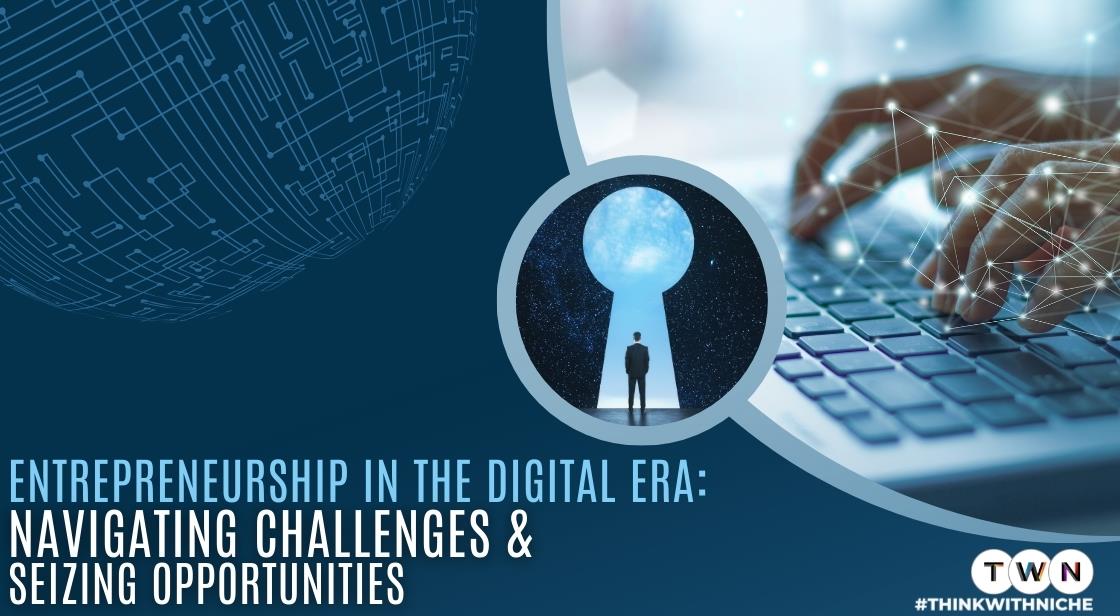Entrepreneurship in the Digital Era: Navigating Challenges and Seizing Opportunities

Blog Post
In an era defined by rapid technological advancement and digital transformation, entrepreneurship has undergone a profound evolution. The digital landscape offers a myriad of opportunities for aspiring innovators and business leaders, yet it also presents a unique set of challenges that demand agility, resilience, and strategic foresight.
"Entrepreneurship in the Digital Era: Navigating Challenges and Seizing Opportunities" encapsulates the dynamic essence of contemporary business endeavors, where navigating the complexities of the digital realm is both a formidable task and a gateway to unprecedented growth.
In this digital age, the barriers to entry have been lowered, empowering individuals from diverse backgrounds to pursue entrepreneurial ventures with greater ease than ever before. The democratization of technology has fostered a fertile ground for creativity and innovation, enabling entrepreneurs to disrupt traditional industries and carve out niches in untapped markets.
However, alongside the boundless opportunities lie formidable challenges, ranging from intense competition and rapidly evolving consumer preferences to cybersecurity threats and data privacy concerns.
To thrive in this landscape, entrepreneurs must possess a multifaceted skill set that encompasses technological fluency, strategic acumen, and a deep understanding of market dynamics. The ability to harness emerging technologies such as artificial intelligence, blockchain, and data analytics can provide a competitive edge, enabling businesses to optimize operations, personalize customer experiences, and unlock new revenue streams.
Yet, success in the digital era is not solely contingent upon technological prowess. It also hinges on the capacity to cultivate a culture of innovation, adaptability, and continuous learning within organizations. Embracing a mindset of experimentation and iteration allows entrepreneurs to navigate uncertainty with confidence, pivot in response to market shifts, and capitalize on emerging trends.
In the face of relentless change and disruption, entrepreneurship in the digital era demands agility, resilience, and an unwavering commitment to innovation. By navigating challenges with ingenuity and seizing opportunities with conviction, entrepreneurs can not only survive but thrive in the dynamic landscape of the digital age.
Mastering the Digital Landscape: Challenges and Triumphs in Entrepreneurship
Introduction to Entrepreneurship in the Digital Era
Definition of Entrepreneurship in the Digital Age
Entrepreneurship in the digital age refers to the process of identifying, creating, and pursuing opportunities in the digital realm. It encompasses the use of digital technologies, platforms, and strategies to innovate, disrupt, and create value in various industries.
Digital entrepreneurs leverage technology to develop innovative products, services, and business models that meet the evolving needs of consumers in a rapidly changing digital landscape.
The Rise of Digital Business
We have seen a dramatic change in the entrepreneurial environment over the past couple decades. The emergence of digital technology and the internet have given rise to a novel form of business known as digital entrepreneurship.
Leveraging digital technology to develop, innovate, and reinvent corporate operations and strategies is what defines this phenomena. In contrast to conventional entrepreneurship, which frequently depends on tangible assets, digital entrepreneurship flourishes in a virtual setting and provides unmatched flexibility and scalability.
Importance of Digital Technology for Entrepreneurs
Digital technology plays a pivotal role in empowering entrepreneurs by providing tools, resources, and platforms to launch and grow businesses. From e-commerce platforms and social media marketing to data analytics and cloud computing, digital technologies enable entrepreneurs to streamline operations, reach a global audience, and scale their ventures more efficiently.
Embracing digital innovation allows entrepreneurs to stay competitive, adapt to market trends, and capitalize on emerging opportunities in the digital economy.
Overview of Challenges and Opportunities
In the digital era, entrepreneurs face a unique set of challenges and opportunities. Challenges include technological disruption, cybersecurity threats, market saturation, digital divide, and regulatory complexities.
However, these challenges are accompanied by vast opportunities such as global reach, data analytics, agile business models, digital marketing, and collaborative ecosystems. By navigating these challenges and leveraging digital opportunities, entrepreneurs can drive innovation, achieve growth, and succeed in the dynamic landscape of the digital era.
Historical Evolution of Digital Entrepreneurship
The historical evolution of digital entrepreneurship has been marked by significant milestones, from the dot-com bubble to the rise of the gig economy, each shaping the landscape of digital business models.
Dot-com Bubble:
The late 1990s witnessed the emergence of the dot-com bubble, a period of rapid growth and speculation in internet-based businesses. Companies like Amazon, eBay, and Yahoo became synonymous with the potential of the internet to disrupt traditional industries and create new market opportunities.
However, the bubble burst in the early 2000s, leading to the collapse of many dot-com companies due to overvaluation and unsustainable business models. Despite the crash, this era laid the foundation for the digital economy and demonstrated the potential of online entrepreneurship.
Rise of E-commerce:
Following the dot-com bubble, the early 2000s saw the rise of e-commerce as a dominant force in digital entrepreneurship. Companies like Amazon continued to thrive, while new players like Alibaba and Shopify entered the market, revolutionizing retail and commerce.
The proliferation of online marketplaces provided entrepreneurs with unprecedented access to global markets, enabling them to reach customers anywhere, anytime. This period also saw the integration of digital payment systems and logistics solutions, further fueling the growth of e-commerce ventures.
Social Media and Web 2.0:
The mid-2000s marked the advent of Web 2.0, characterized by the rise of social media platforms and user-generated content. Websites like Facebook, Twitter, and YouTube transformed the internet into a social and interactive space, opening up new opportunities for digital entrepreneurship.
Entrepreneurs leveraged social media to build personal brands, engage with customers, and launch viral marketing campaigns. This era also saw the emergence of content creators, influencers, and digital marketers who monetized their online presence through advertising, sponsorships, and affiliate marketing.
Sharing Economy and Gig Economy:
In the 2010s, the sharing economy and gig economy emerged as dominant trends in digital entrepreneurship. Companies like Airbnb, Uber, and TaskRabbit disrupted traditional industries by enabling peer-to-peer sharing of resources and services.
The sharing economy facilitated the rise of collaborative consumption, allowing individuals to monetize underutilized assets like spare rooms, cars, and skills. Similarly, the gig economy transformed the nature of work, with platforms like Upwork and Freelancer connecting freelancers and businesses for project-based work.
This shift towards on-demand and flexible employment created new opportunities for digital entrepreneurs to offer services and solutions in a dynamic and decentralized marketplace.
Challenges Faced by Digital Entrepreneurs
1. Technological Disruption:
Digital entrepreneurs face the challenge of constant technological disruption, requiring them to adapt quickly to evolving technologies. This includes staying updated with new software, hardware, and platforms, as well as understanding how emerging technologies like artificial intelligence and blockchain impact their businesses.
2. Cybersecurity Threats:
One of the foremost challenges for digital entrepreneurs is cybersecurity threats. With the increasing reliance on digital infrastructure and data-driven operations, entrepreneurs must safeguard their systems and sensitive information from cyber attacks, data breaches, and other malicious activities.
3. Market Saturation:
The digital marketplace is highly competitive, with numerous businesses vying for consumers' attention. Digital entrepreneurs often struggle to stand out amidst the saturation, leading to challenges in acquiring and retaining customers. Developing unique value propositions and effective marketing strategies is essential to overcome this challenge.
4. Digital Divide:
The digital divide poses a significant challenge for entrepreneurs, especially in regions with limited access to technology and digital skills. Bridging this gap requires initiatives to improve digital literacy, infrastructure, and accessibility, ensuring that all entrepreneurs have equal opportunities to leverage digital tools and resources.
5. Data Privacy and Regulation:
Digital entrepreneurs must navigate complex data privacy regulations, such as GDPR and CCPA, to ensure compliance and protect user data. Adhering to these regulations while leveraging data-driven strategies poses a challenge, requiring entrepreneurs to strike a balance between innovation and privacy protection.
Seizing Opportunities In Digital Entrepreneurship
Digital entrepreneurship offers an array of opportunities for individuals to create and grow businesses in the digital realm.
Accessibility: The internet provides a global platform for entrepreneurs to reach a vast audience, breaking down geographical barriers.
Innovation: Digital tools and technologies enable innovative business models and solutions, fostering creativity and disruption.
Market Disruption: Entrepreneurs can leverage digital platforms to disrupt traditional industries, challenging established norms and creating new markets.
Scalability: Digital businesses have the potential for rapid scalability, allowing entrepreneurs to grow their ventures quickly and efficiently.
Data Utilization: Access to data analytics empowers entrepreneurs to make informed decisions, optimize processes, and personalize customer experiences.
Collaboration: Digital entrepreneurship fosters collaboration and networking opportunities, enabling entrepreneurs to connect with peers, mentors, and potential partners globally.
Flexibility: The digital landscape offers flexibility in terms of business models, work arrangements, and revenue streams, allowing entrepreneurs to adapt to changing market conditions.
Dealing with Technological Changes and Innovation
The Rapid Pace of Technological Advancements:
Technological advancements occur at a rapid pace in today's digital era, necessitating entrepreneurs to continuously evolve and adapt. From artificial intelligence and machine learning to blockchain and the Internet of Things (IoT), staying updated with these changes is essential for business survival and growth.
Anticipating Future Trends:
Entrepreneurs not only need to adapt to current technologies but also anticipate future trends to stay ahead of the curve. By closely monitoring industry developments, consumer behaviors, and emerging technologies, entrepreneurs can position themselves to capitalize on new opportunities and mitigate potential threats.
The Challenge and Opportunity of Innovation:
While the need for innovation presents a challenge, it also offers significant opportunities for entrepreneurs. By embracing innovation, entrepreneurs can differentiate themselves from competitors, enhance operational efficiency, and drive business growth.
Moreover, innovation fosters creativity, resilience, and adaptability, traits that are crucial for long-term success in today's dynamic business environment.
Insights from Research:
A review in the Journal of Innovation and Entrepreneurship underscores the impact of digital innovation on entrepreneurship. The study reveals that technological changes account for a substantial portion (35-40%) of the dynamics in entrepreneurship.
Furthermore, internet usage has been found to lead to decreased operational costs and increased sales for a majority of companies. However, despite the benefits, adapting to these technological changes remains a significant challenge for many entrepreneurs.
Navigating the Challenges:
To effectively deal with technological changes and innovation, entrepreneurs must adopt a proactive approach. This involves investing in ongoing learning and development, fostering a culture of experimentation and risk-taking within their organizations, and leveraging partnerships and collaborations to access specialized expertise and resources.
Additionally, embracing agility and flexibility allows entrepreneurs to quickly pivot in response to changing market dynamics and technological disruptions.
Opportunities in the Digital Era
The digital era has brought forth a plethora of opportunities for entrepreneurs, leveraging digital technologies to innovate, expand, and thrive in a global marketplace.
Global Reach and Niche Markets
Digital technologies have obliterated geographical barriers, empowering entrepreneurs to reach audiences worldwide. This unprecedented global reach transcends traditional boundaries, allowing businesses to tap into niche markets that were previously inaccessible.
By leveraging digital platforms and online channels, entrepreneurs can identify and target specific demographics with tailored products and services, thereby unlocking new avenues for business growth and expansion.
Leveraging Digital Marketing and Social Media
Digital marketing and social media have emerged as indispensable tools for entrepreneurs to connect with consumers and build brand presence. These platforms offer targeted advertising capabilities, enabling businesses to reach their ideal audience with precision and efficiency.
Moreover, social media facilitates direct engagement with customers, fostering authentic interactions and loyalty.
Entrepreneurs can leverage analytics and insights from digital marketing campaigns to refine their strategies and optimize ROI, thereby maximizing the impact of their marketing efforts in the digital landscape.
Advantages of E-commerce and Online Platforms
The rise of e-commerce platforms has revolutionized the way businesses operate and interact with customers. Entrepreneurs can now establish online storefronts to showcase their products and services to a global audience, 24/7.
This accessibility not only expands market reach but also reduces overhead costs associated with traditional brick-and-mortar establishments. Furthermore, e-commerce platforms offer opportunities for personalization and customization, allowing entrepreneurs to create tailored experiences that resonate with their target audience.
By embracing e-commerce and online platforms, entrepreneurs can streamline operations, enhance customer satisfaction, and drive revenue growth in the digital era.
Fostering Entrepreneurship Expansion
A study published in the Journal of Innovation and Entrepreneurship confirms the symbiotic relationship between digital innovation and entrepreneurship expansion. Digital innovation provides entrepreneurs with the tools and resources to venture into new markets and opportunities.
In turn, entrepreneurship drives further innovation, creating a positive feedback loop that fuels economic growth and development. By harnessing digital technologies and embracing innovation, entrepreneurs can capitalize on emerging trends and disrupt industries, paving the way for continued expansion and success in the digital era.
Also Read: Strategies of entrepreneurship development
Strategies for Successful Digital Entrepreneurship
In the dynamic realm of digital entrepreneurship, success relies on strategic planning and astute execution. Here are key strategies that can propel digital businesses towards success:
Innovative Business Modeling
Digital entrepreneurs must continuously innovate their business models to stay relevant in the fast-paced digital landscape. This involves understanding market trends, customer behaviors, and technological advancements.
By creating value propositions that resonate with the digital audience and leveraging digital platforms for efficient product or service delivery, entrepreneurs can maintain a competitive edge.
Data-Driven Decision Making
In the digital world, data is a powerful asset. Successful entrepreneurs leverage data analytics to gain insights into customer preferences, market trends, and operational efficiency.
This data-driven approach enables informed decision-making, allowing entrepreneurs to tailor their marketing strategies and optimize their products or services for better market fit.
Cultivating Digital Leadership and Culture
As digital transformation reshapes industries, fostering a digital-first culture within the organization becomes crucial. Digital leaders must promote innovation, agility, and a continuous learning mindset. By encouraging experimentation and digital literacy, leaders can equip their teams to adapt to the evolving digital landscape effectively.
Leveraging Digital Marketing and SEO
An effective digital marketing strategy is essential for online visibility and customer acquisition. Entrepreneurs should utilize search engine optimization (SEO) to improve their search engine rankings, increasing organic traffic to their websites. Additionally, leveraging social media platforms, content marketing, and email campaigns can help build brand awareness and engage with the target audience more effectively.
Customer Experience Optimization
In the digital arena, customer experience can be a game-changer. Entrepreneurs must focus on creating seamless, engaging, and personalized experiences for their customers. This can be achieved through user-friendly website design, intuitive e-commerce platforms, and providing excellent customer service.
Adapting to Technological Advancements
Staying abreast of the latest digital technologies and trends is vital for digital entrepreneurs. They should be open to adopting new technologies such as AI, blockchain, or IoT, which can offer competitive advantages, improve operational efficiency, or open up new business opportunities.
Building Strategic Partnerships
Forming strategic alliances and partnerships can accelerate growth for digital entrepreneurs. Collaborations with other companies, tech providers, or digital influencers can provide access to new markets, technologies, and expertise, enabling entrepreneurs to expand their reach and capabilities.
By implementing these strategies, digital entrepreneurs can navigate the complexities of the digital landscape and position their businesses for long-term success and growth.
Case Studies: Success Stories in Digital Entrepreneurship
Digital entrepreneurship has been exemplified by the remarkable success stories of visionaries like Jeff Bezos, Mark Zuckerberg, and Reid Hoffman, who have leveraged digital technologies to build transformative businesses.
Jeff Bezos and Amazon:
Jeff Bezos' journey with Amazon epitomizes the ability to seize digital opportunities and transform them into global success. What began as an online bookstore in 1994 has evolved into the world's largest e-commerce platform, offering a vast array of products and services.
Bezos' strategic vision involved aggressive expansion into new markets, a relentless focus on customer satisfaction, and the pioneering use of data analytics to drive business decisions.
Amazon's success goes beyond merely selling products; it's about understanding and anticipating customer needs while continuously innovating in areas such as logistics, cloud computing (Amazon Web Services), and artificial intelligence (Alexa).
Mark Zuckerberg and Facebook:
Mark Zuckerberg's creation of Facebook revolutionized the way people connect and communicate online. From its humble beginnings as a social networking platform for college students, Facebook has grown into a global phenomenon with billions of users worldwide.
Zuckerberg's key to success lay in recognizing the potential of connecting people digitally and providing them with a platform to share, communicate, and engage. Facebook's growth strategy has been characterized by continuous platform development, strategic acquisitions (such as Instagram and WhatsApp), and the monetization of user data through targeted advertising.
This approach has not only transformed the landscape of digital communication but also revolutionized digital marketing, making Facebook a dominant force in the industry.
Reid Hoffman and LinkedIn:
Reid Hoffman's LinkedIn has redefined professional networking, providing a dedicated platform for career advancement and professional connections. Founded in 2002, LinkedIn has become an indispensable tool for professionals and companies alike, facilitating recruitment, networking, and knowledge sharing.
Hoffman's vision for LinkedIn included integrating educational and recruitment services, making it a comprehensive resource for professionals seeking to advance their careers. By focusing on building a trusted network and providing valuable services, LinkedIn has solidified its position as the leading professional networking platform globally.
Digital Entrepreneurship Examples
Personalized Learning Platform:
-
Description: An online platform utilizing AI to personalize learning experiences.
-
Goal: Making education more engaging and accessible.
Data-Driven Digital Marketing Firm:
-
Description: A firm employing big data for crafting effective ad campaigns.
-
Goal: Driving unparalleled return on investment (ROI) for clients.
Sustainable Fashion E-Commerce Brand:
-
Description: An e-commerce brand focusing on sustainable fashion.
-
Strategies: Engaging storytelling and community involvement.
-
Outcome: Building a devoted customer base.
Conclusion
Digital entrepreneurship harnesses technology to innovate, disrupt industries, and create global opportunities, despite challenges like cybersecurity and market saturation. Successful strategies include innovative business modeling, data-driven decisions, and fostering digital leadership.
You May Like
EDITOR’S CHOICE












